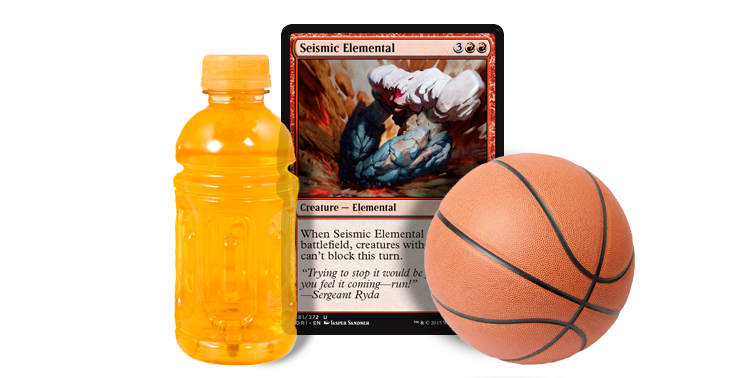CABS Theory
After five weeks of deep dives on the colors of Magic Origins, I figured it would be good for you and me to take a step back. I like hitting a mix of current-set-specific topics and also bigger picture strategic topics in this column. That way you can stay up to date on the latest happenings, but also continue to march your overall game abilities in the forward direction.
I talk a lot here and on the podcast and basically wherever else they let me about improving in Limited. I do this because I find winning to be more fun, and because I believe improving at basically anything is a worthy pursuit. I've also noticed that the skills you need to be good in Limited often translate to real life, which I didn't expect when I started this journey.
Anyway, we are going to talk about fundamentals and CABS Theory this week on the column. This may be the best way to quickly improve at Booster Draft.
Board Affecting Cards or Nothing
"It doesn't affect the board state, though."
I've said this so many times. I've even said it in this column, I'm sure. It's something I think about a lot when I'm evaluating a card, or building a deck, or making a choice in a booster draft.
My theory is that you can only have so many cards that don't affect the board state directly before your deck starts to suffer.
I call this "CABS" Theory, which is short for "Cards (that) Affect the Board State".
Most people don't factor in whether a card affects the board or not when they evaluate a card. The questions are usually centered around outright power level, "rate" (basically The Vanilla Test, but for all cards. Think "efficiency"), overall mana cost, etc. And this makes some sense, too. After all, many very strong cards don't directly affect the board state at all.
Let's stop here and define what I mean when I say "affects the board state."
There are three types of cards that affect the board state, and they are:
- Creatures—Creatures are easily the most important card type in Limited. It's not close, either. 99% of Limited games are won with creatures. Creatures give you a way to stay alive, they are a way to come from behind, and they are the way you win. They are recurring sources of damage, and they can function as virtual removal spells while blocking. They are the most proactive things you can do in Limited.
- Removal—Removal spells are the scarcest of the three resources here, and they are important because they kill the most important thing (creatures). Being a scarce commodity means that they will often get picked ahead of creatures in Draft.
- Combat Tricks—Combat tricks affect the board directly, assuming you have at least one creature. They are riskier, and the least important of the three categories, but they do have their place. Ideally they function similar to removal, as they help you win combat by making your creature big enough to kill the opposing blocker.
These are the card types that makes up a good CABS deck.
There is more to the equation, however.

Jayemdae Tome | Art by Donato Giancola
Here are your CABS Commandments:
- You will NOT splash extra colors. You will play two colors, no more. There is no such thing as a free splash.
- You will have a good mana curve. This will prioritize the two- and three-mana slots for creatures. You will avoid seven-drops.
- You will have fifteen to eighteen creatures in your deck.
- You will avoid card-draw spells, build-around-me enchantments, counterspells, life gain spells, and the like.
- Every card in your deck will have a low setup cost. Your cards stand on their own; they don't require any gymnastics to be good.
- You will have a simple, clear game plan of beating down your opponent. No milling or combos—just beats.
- You will prioritize "solid doubles" over "strikeout/home run" cards. This means that you want cards that are consistently good rather than cards that are sometimes very good but sometimes very bad.
In a nutshell, CABS Theory sets a fundamental baseline for what a Limited deck should look like. Your most fundamental Limited deck would contain ONLY cards that fit the criteria above. That's it. Every card in your deck is a creature, a removal spell, or a combat trick.
Every single one.
Try it.
I know it can be painful not to play some sweet, non-board-affecting card. There are good ones that deserve a slot in most decks that can draft them, but your most fundamental deck will not contain cards like this.
The reasoning here is that if you get great at drafting rock-solid CABS-style decks, you'll have a baseline from which to make the decisions on when to break those rules.
Here's a personal story to help illustrate this point:
I played basketball when I was in high school. It was pretty much all I thought about back then; I lived and breathed it. It was my first true passion. And when I made it onto the high school team of the school I had recently moved to, I was super stoked. You see, I grew up playing street ball; basically disorganized basketball played outdoors. No referees, no consistent teams, and with a set of rules that has differences to true, organized ball.
But the coaches liked enough of what they saw in me, and gave me a chance. The problem was that I had never played real organized basketball before. I didn't even know how to do most of the practice drills. You know—the drills the other players had been doing since they were small children. I could do the actual actions within in the drill, but the drills themselves were foreign to me.

Put me in, Coach!
When we played practice games, I had some sweet moves I had worked on in the street. They worked in the games I played growing up, why wouldn't they work now? The Problem: If the player defending me figured out where I was going with my move, they could stop me and I didn't have the ability to adjust because I lacked fundamentals.
My coach told me that I would have to work on the fundamentals of the game before I could bust out the fancy moves I had worked so hard on. But he was a good coach and I trusted him, so I put in a lot of effort getting the foundation built right. Along the way, I was tempted to use my old moves, because I knew that they would get the job done in that moment, but I didn't because I knew that it would undermine my overall development as a player.
After putting the work in, my fundamentals improved and I was able to build out a much wider range of moves than I had previously. Working from a solid, fundamental starting point gave me the ability to break out of it when the opportunities presented themselves.
CABS Theory is about getting your fundamentals straight, so that you know what a rock-solid Draft deck looks like before you go chasing build-around-me uncommons and crazy combos.
Ultimately, your best possible Draft decks will contain a carefully considered combination of CABS cards, plus non-CABS cards and strategies as well.
But if you don't have the ability to build a super solid CABS-style deck, you won't know when it's correct to deviate from your fundamental base.
I know a lot of high-level professional players who effectively use CABS-style drafting as their baseline strategy with great success.
Catching CABS
Play good cards, on time, almost every game. You'll take full advantage of people who don't draft this way. You'll have fewer instances of mulligans, because you'll have a good mana curve, only two colors, and exclusively spells that actually do something when you cast them.
You'll also run over the players who are not drafting in this style when they stumble on mana, can't cast their expensive spells, draw multiple cards that don't affect the board, or simply have a slow start.
Here's an example to show you how simple-yet-effective this strategy can be:
Say we are on the play in a Magic Origins draft, and we start out with Cleric of the Forward Order on turn two. Our opponent plays their second land, and passes the turn. We attack for two with the Cleric, play our third land and cast Knight of the Pilgrim's Road before passing the turn.
Our opponent plays a land and plays Read the Bones, falling to 16 life.
If we pause here, we see how powerful this strategy can be versus someone who isn't playing this way. We are already attacking for a minimum of 5 damage on our turn, putting our opponent to 11 life. With almost any reasonable creature, combat trick, or removal spell, we are going to be firmly in the driver's seat to win the game regardless of what creature our opponent finds with Read the Bones.
I intentionally used mid-level cards in this scenario; we could have gone Topan Freeblade into Acolyte of the Inferno or Citadel Castellan for a real pounding.
If you have been struggling with Limited and just can't seem to find your groove, try CABS drafting. You'll see the power that comes with never missing a beat. And after you get it down, you can start branching out into non-CABS cards as you see fit.
As I said earlier, CABS drafting is meant to be a baseline, but not necessarily the end game for your strategic development.
Until next week!
